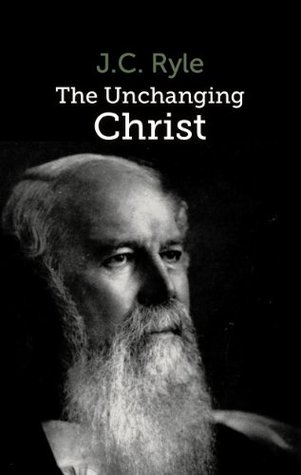- Bible
- Read the Bible
- Bible Versions
- Verse of the Day
- Reading Plans
- Verses by Topic
- Books of the Bible
- Bible Images
- Study
- Commentaries
- Concordances
- Dictionaries
- Encyclopedias
- Sermons
- Bible Atlas & Maps
- BP Wiki
- Devotionals
- Today's Devotionals
- Light of the World
- All Devotionals
- Inspirational Quotes
- More
- Picture Quotes
- Videos
- Inspirational
- Bible Study
- What The Bible Says
- Bible Q&As
- Daily Bread
- Bible by Genre
- Bible Stories
- Random Bible Verse
- Community
- Store
The Unchanging Christ
by J.C. Ryle
"Always the same! It is this which makes the gospel so excellent and precious. We do not bid you depend on anything less than the tried corner-stone, the fountain whose water shall never fail—the city of refuge whose walls shall never be broken down—the sure Rock of Ages. Churches may decay and perish; riches may make themselves wings and fly away—but he who builds his happiness on Christ crucified and union with Him by faith, that man is standing on a foundation which shall never be moved, and will know something of true peace."
The chapters in this book include:
—To whom?
—The Cross of Christ
—The Blood of the Lamb
—Christ's Power to Save
—The Best Friend
—The Unchanging Christ
—What Do You Think About Christ?
The chapters in this book include:
—To whom?
—The Cross of Christ
—The Blood of the Lamb
—Christ's Power to Save
—The Best Friend
—The Unchanging Christ
—What Do You Think About Christ?
BUY NOW
Kindle Edition, 93 pages
Published June 4th 2013
© 2025 Bibleportal.com All rights reserved.

J.C. Ryle (1816 - 1900)
J.C. Ryle was a prolific writer, vigorous preacher, faithful pastor, husband of three wives, [widowed three times: Matilda died in 1847, Jessie died in 1860, Henrietta died in 1889] and the father to five children [1 with Matilta and 4 with Jessie]. He was thoroughly evangelical in his doctrine and uncompromising in his Biblical principles. In 1880, after 38 years in Pastoral ministry in rural England, at age 64, he became the first Anglican bishop of Liverpool. He retired in 1900 at age 83 and died later the same year at the age of 84.“He [J.C. Ryle] was great through the abounding grace of God. He was great in stature; great in mental power; great in spirituality; great as a preacher and expositor of God’s most holy Word; great in hospitality; great as a writer of Gospel tracts; great as a Bishop of the Reformed Evangelical Protestant Church in England, of which he was a noble defender; great as first Bishop of Liverpool. I am bold to say, that perhaps few men in the nineteenth century did as much for God, for truth, and for righteousness, among the English speaking race, and in the world, as our late Bishop.” - Rev. Richard Hobson, three days after Ryle’s burial in 1900.
John Charles Ryle was the first Anglican bishop of Liverpool. Ryle was a strong supporter of the evangelical school and a critic of Ritualism. Among his longer works are Christian Leaders of the Eighteenth Century (1869), Expository Thoughts on the Gospels (7 vols, 1856-69), Principles for Churchmen (1884).
Thoroughly evangelical in his doctrine and uncompromising in his principles, J.C. Ryle was a prolific writer, vigorous preacher, and faithful pastor.
In his diocese, he exercised a vigorous and straightforward preaching ministry, and was a faithful pastor to his clergy, exercising particular care over ordination retreats. He formed a clergy pension fund for his diocese and built over forty churches. Despite criticism, he put raising clergy salaries ahead of building a cathedral for his new diocese.
Ryle combined his commanding presence and vigorous advocacy of his principles with graciousness and warmth in his personal relations. Vast numbers of working men and women attended his special preaching meetings, and many became Christians.
John Charles Ryle was born at Macclesfield and was educated at Eton and at Christ Church, Oxford. He was a fine athlete who rowed and played Cricket for Oxford, where he took a first class degree in Greats and was offered a college fellowship (teaching position) which he declined. The son of a wealthy banker, he was destined for a career in politics before answering a call to ordained ministry.
He was spiritually awakened in 1838 while hearing Ephesians 2 read in church. He was ordained by Bishop Sumner at Winchester in 1842. After holding a curacy at Exbury in Hampshire, he became rector of St Thomas's, Winchester (1843), rector of Helmingham, Suffolk (1844), vicar of Stradbroke (1861), honorary canon of Norwich (1872), and dean of Salisbury (1880). In 1880, at age 64, he became the first bishop of Liverpool, at the recommendation of Prime Minister Benjamin Disraeli. He retired in 1900 at age 83 and died later the same year.
Ryle was a strong supporter of the evangelical school and a critic of Ritualism. Among his longer works are Christian Leaders of the Eighteenth Century (1869), Expository Thoughts on the Gospels (7 vols, 1856-69) and Principles for Churchmen (1884).
... Show more